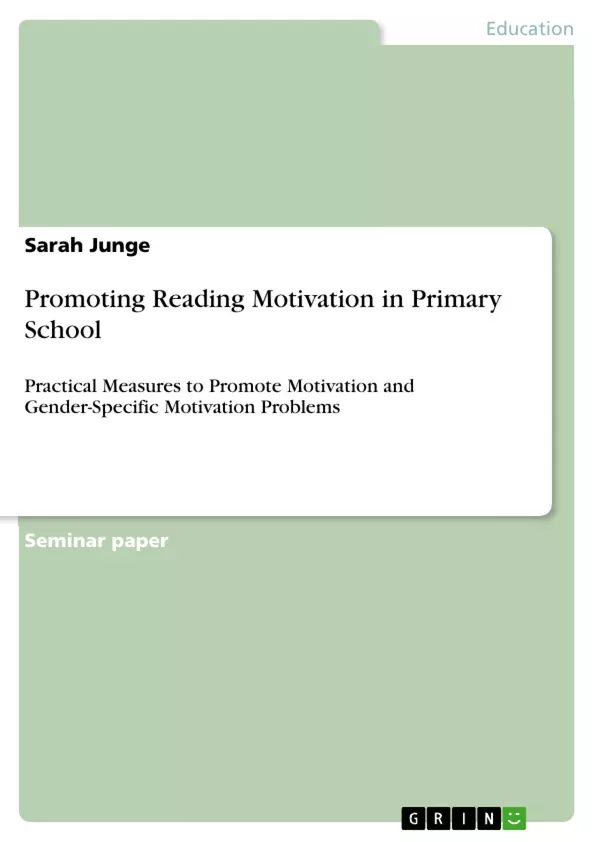The ability to read is an important prerequisite for participating in social life. Without it, many areas of daily life are not accessible. It was precisely under this aspect that the results of the Pisa study presented to the public were all the more shocking. The findings regarding the reading motivation of pupils indicated that 42% of the participating German 15-year-olds never read for pleasure, including not only reading books but also newspapers and magazines.
However, since my topic is "Promoting reading motivation in primary school", one might ask why findings from the PISA study are cited that do not show the performance of primary school students but that of 15-year-old school leavers. The reason is that these poor results are rooted in the beginning of the school years. If primary school teachers do not succeed in conveying "reading" as something enjoyable and enriching from the beginning, children will not see reading as something personally valuable either and may turn their backs on books already during their primary school years and migrate to other media such as computers or game consoles. The central question of the is which social factors have a promoting and inhibiting effect on children's motivation to read and to what extent primary school can contribute to creating a long-term love of reading among pupils.
First, the family environment is discussed as an important influencing factor in the development of a person's reading motivation. The second important influencing factor will be school, whereby I will limit myself to primary school. Starting with motivation problems at the beginning of the initial lessons, through problems in the continuing reading lessons, to the motivation problem among boys. Gender-specific differences in reading behaviour will be explained and attempted explanations given. In addition, school-based solution perspectives are pointed out. The last chapter of this thesis deals with practical support possibilities, i.e. it shows methods that the primary school teacher can use in class to increase the reading motivation of his pupils.
Table of Contents
- Introduction
- Conceptual theoretical and conceptual considerations
- On the concept of reading motivation
- Extrinsic and intrinsic reading motivation
- The relationship between reading competence and reading motivation
- Social factors influencing the reading motivation of primary school pupils
- The importance of the reading climate in the family
- The importance of school
- Motivation problems in reading lessons
- Motivation problems at the beginning of school and in the first reading lessons
- Motivation problems in further reading lessons
- The meaning of gender: Reasons for motivation problems in boys
- Practical ways to promote reading motivation in the classroom
- The stimulating reading environment
- Children's books as class reading
- Reading aloud and author encounters
- Reading pleasure with the reading box
- Summary and conclusion
Objectives and Key Themes
This work aims to investigate the social factors that influence reading motivation in primary school pupils, exploring both supportive and inhibiting elements. It seeks to determine the extent to which primary education can contribute to long-term reading enjoyment in students.
- The concept of reading motivation and its various types
- The connection between reading competence and reading motivation
- The role of family and school environments in shaping reading motivation
- Motivation problems encountered in reading lessons, particularly for boys
- Practical strategies for promoting reading motivation in the classroom
Chapter Summaries
- Introduction: This chapter introduces the importance of reading ability in social life and discusses the concerning results of the PISA study regarding reading motivation in German students. It highlights the crucial role of primary school teachers in fostering a love of reading from an early age to prevent children from disengaging with books.
- Conceptual theoretical and conceptual considerations: This chapter delves into the concept of reading motivation, exploring its different types, both intrinsic and extrinsic. It also examines the relationship between reading competence and motivation, emphasizing its significance in understanding motivation problems.
- Social factors influencing the reading motivation of primary school pupils: This chapter analyzes the impact of various social factors on reading motivation, focusing on the family environment and the role of the school.
- Motivation problems in reading lessons: This chapter examines motivation challenges encountered in reading lessons, from the initial stages of learning to read to ongoing struggles. It also explores gender-specific differences in reading behavior and offers possible solutions.
- Practical ways to promote reading motivation in the classroom: This chapter provides practical strategies that primary school teachers can implement in the classroom to cultivate reading motivation. It highlights the importance of a stimulating reading environment, using children's books, reading aloud, and engaging in author encounters.
Keywords
Key terms and concepts explored in this work include reading motivation, intrinsic and extrinsic motivation, reading competence, social factors, family environment, school climate, motivation problems, gender differences, and practical strategies for promoting reading motivation.
Frequently Asked Questions
Why is reading motivation important in primary school?
If children don't find reading enjoyable early on, they often turn away from books during their teenage years, as seen in shocking PISA results.
What is the difference between intrinsic and extrinsic reading motivation?
Intrinsic motivation comes from personal enjoyment of the book, while extrinsic motivation is driven by rewards or fear of punishment.
How does the family environment affect reading?
A positive reading climate at home is a crucial factor in developing a child's long-term interest in literature.
Why do boys often have lower reading motivation?
The thesis explores gender-specific differences and suggests that teaching methods and book choices often cater less to typical interests of boys.
What are practical ways to promote reading in class?
Strategies include creating stimulating reading environments, reading aloud, author encounters, and using "reading boxes."
- Arbeit zitieren
- Sarah Junge (Autor:in), 2009, Promoting Reading Motivation in Primary School, München, GRIN Verlag, https://www.grin.com/document/1162479



